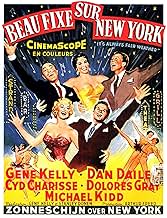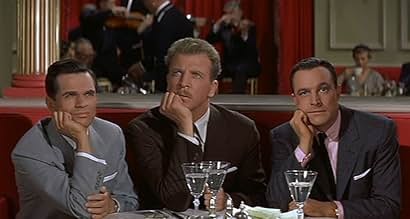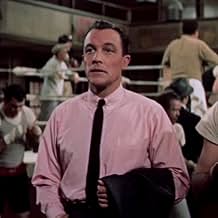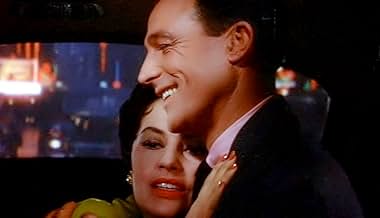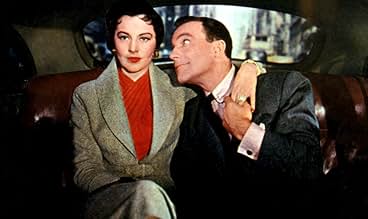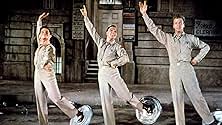IMDb-BEWERTUNG
7,0/10
4185
IHRE BEWERTUNG
Füge eine Handlung in deiner Sprache hinzuThree soldiers meet ten years after their last meeting in New York, and find out that they have little in common now.Three soldiers meet ten years after their last meeting in New York, and find out that they have little in common now.Three soldiers meet ten years after their last meeting in New York, and find out that they have little in common now.
- Für 2 Oscars nominiert
- 3 Nominierungen insgesamt
David Ahdar
- Dancing Boxer
- (Nicht genannt)
Betty Arlen
- Girl
- (Nicht genannt)
Phil Arnold
- Butch - Assistant at Stillman's Gym
- (Nicht genannt)
Sybil Bacon
- Woman on Skates
- (Nicht genannt)
Walter Bacon
- Bartender
- (Nicht genannt)
Jimmy Baird
- Child Dancer
- (Nicht genannt)
Tom Bernard
- Page
- (Nicht genannt)
Rodney Bieber
- Dancing Boxer
- (Nicht genannt)
Madge Blake
- Mrs. Stamper
- (Nicht genannt)
Willie Bloom
- Bar Patron
- (Nicht genannt)
Empfohlene Bewertungen
It's Always Fair Weather will go down in history as the film musical which "could have been". Had it been made a few years earlier it could have been in the same leagues as Singin' In the Rain and On the Town but several shortcomings, some determined by the period the film was made prevent it from being so. Even the studio had that little faith in it they dumped it as a second feature alongside Bad Day At Black Rock.
It's Always Fair Weather differs from other musicals of its time in its sombre tone with the tale of three war buddies who are reunited ten years later to find out they can't stand each other upon discovering one is a hick, a snob and a goon. This is juxtaposed to a world of beautiful, bright colours and welcome artificiality with urban sets to die for. It's Always Fair Weather was originally conceived as a sequel to On the Town, reuniting Gene Kelly with co-stars Frank Sinatra and Jules Munshin. However, by 1955, Munshin no longer had box office credibility while Sinatra was too big a star that the studio was unwilling to work with him. In their place, we get Dan Dailey and Michael Kidd, both of whom get the job done but lack the same electric chemistry Kelly's On the Town co-stars possessed. Frank Sinatra in particular I find is sorely missed as I loved his three-picture partnership with Kelly in which they made an excellent comedic duo. None the less the roaster does get a big boost with the casting of the great Cyd Charisse, whom like Ann Miller in On the Town, plays a glamorous woman with contradictory personality and an encyclopedic knowledge of well, pretty much any topic.
However, I find It's Always Fair Weather's biggest drawback are the sections of the film which are uneventful and doesn't have the lightning-fast pace of On The Town or Singin' In The Rain. The film could definitely benefit from the trimming or removal of whole scenes; there is a faster-paced, snappier film in here. The film does help make up for this though in its musical numbers. It's Always Fair Weather does showcase some of the best moments of any MGM musical with the soundtrack being one of the best in the MGM catalogue. The musical numbers and compositions are fantastic and all written for the film itself by the great Betty Comden and Adolph Green, while the majority of MGM musicals took their songs from their back catalogue as well as other stage musicals.
The five-minute Gershwin like dance number "The Binge" showcases the then-new cinemascope format by having three dancers occupy their own third of the screen as they dance and create percussion with trash can lids on their feet as they work together in great physical tandem of drunken joy. Once Upon a Time, on the other hand, is a heart aching number if there was one as the three men sing about their broken dreams while Music is Better Than Words couldn't be more enchanting if you asked for it. The centrepiece of the film, however, is Gene Kelly's number 'I Like Myself', featuring him tap dancing on roller skates, no trickery! Like Singin' In the Rain, the number is an encapsulation of pure happiness (just look at the faces of the onlooking extras). This is of my favourite musical numbers of all time and is an unbelievable display of talent if I ever saw it. The film's only crime in the song and dance department is the lack of a dance number between Gene Kelly and Cyd Charisse, despite one actually being filmed.
I feel widescreen technology came too late the MGM musicals which could have used it to great advantage but by 1955 musicals had already lost most of their economic viability due to the rise of television. It's Always Fair Weather is Hollywood coming to terms with the existence of its rival television but relishes the opportunity to satirize the format as superficial and ridden with advertising.
It's Always Fair Weather differs from other musicals of its time in its sombre tone with the tale of three war buddies who are reunited ten years later to find out they can't stand each other upon discovering one is a hick, a snob and a goon. This is juxtaposed to a world of beautiful, bright colours and welcome artificiality with urban sets to die for. It's Always Fair Weather was originally conceived as a sequel to On the Town, reuniting Gene Kelly with co-stars Frank Sinatra and Jules Munshin. However, by 1955, Munshin no longer had box office credibility while Sinatra was too big a star that the studio was unwilling to work with him. In their place, we get Dan Dailey and Michael Kidd, both of whom get the job done but lack the same electric chemistry Kelly's On the Town co-stars possessed. Frank Sinatra in particular I find is sorely missed as I loved his three-picture partnership with Kelly in which they made an excellent comedic duo. None the less the roaster does get a big boost with the casting of the great Cyd Charisse, whom like Ann Miller in On the Town, plays a glamorous woman with contradictory personality and an encyclopedic knowledge of well, pretty much any topic.
However, I find It's Always Fair Weather's biggest drawback are the sections of the film which are uneventful and doesn't have the lightning-fast pace of On The Town or Singin' In The Rain. The film could definitely benefit from the trimming or removal of whole scenes; there is a faster-paced, snappier film in here. The film does help make up for this though in its musical numbers. It's Always Fair Weather does showcase some of the best moments of any MGM musical with the soundtrack being one of the best in the MGM catalogue. The musical numbers and compositions are fantastic and all written for the film itself by the great Betty Comden and Adolph Green, while the majority of MGM musicals took their songs from their back catalogue as well as other stage musicals.
The five-minute Gershwin like dance number "The Binge" showcases the then-new cinemascope format by having three dancers occupy their own third of the screen as they dance and create percussion with trash can lids on their feet as they work together in great physical tandem of drunken joy. Once Upon a Time, on the other hand, is a heart aching number if there was one as the three men sing about their broken dreams while Music is Better Than Words couldn't be more enchanting if you asked for it. The centrepiece of the film, however, is Gene Kelly's number 'I Like Myself', featuring him tap dancing on roller skates, no trickery! Like Singin' In the Rain, the number is an encapsulation of pure happiness (just look at the faces of the onlooking extras). This is of my favourite musical numbers of all time and is an unbelievable display of talent if I ever saw it. The film's only crime in the song and dance department is the lack of a dance number between Gene Kelly and Cyd Charisse, despite one actually being filmed.
I feel widescreen technology came too late the MGM musicals which could have used it to great advantage but by 1955 musicals had already lost most of their economic viability due to the rise of television. It's Always Fair Weather is Hollywood coming to terms with the existence of its rival television but relishes the opportunity to satirize the format as superficial and ridden with advertising.
Just an aside,really:
You notice how sparsely Gene Kelly's finest numbers are shot? Long takes,little in the way of cinematic flair? Well,ponder this for a moment-he will often do something truly spectacular at the end of a take,leading one to wonder just how many times the poor chap put himself through the preceding minutes before getting it right...
A case in point is the justly famed (among those in the know) "Rollerskate Number":In order to demonstrate that the skates are,indeed,authentic,Kelly will swap-flawlessly-from "tap" to "glide" at the end of each take.
Incredible.
Compare and contrast,by the way,with protege Donald O'Connor's emulation in "I Love Melvin"-we never see thetwo movements co-existing within the same shot.
Gene Kelly made me want to dance when I was 11,and not feel like a poof for doing so.
You notice how sparsely Gene Kelly's finest numbers are shot? Long takes,little in the way of cinematic flair? Well,ponder this for a moment-he will often do something truly spectacular at the end of a take,leading one to wonder just how many times the poor chap put himself through the preceding minutes before getting it right...
A case in point is the justly famed (among those in the know) "Rollerskate Number":In order to demonstrate that the skates are,indeed,authentic,Kelly will swap-flawlessly-from "tap" to "glide" at the end of each take.
Incredible.
Compare and contrast,by the way,with protege Donald O'Connor's emulation in "I Love Melvin"-we never see thetwo movements co-existing within the same shot.
Gene Kelly made me want to dance when I was 11,and not feel like a poof for doing so.
The folks that brought you Singing In The Rain, Gene Kelly, Stanley Donen, Betty Comden, Adolph Green, Cyd Charisse, and Arthur Freed combined their considerable talents to give us one of the last of the great MGM screen musicals in It's Always Fair Weather. The film got two Oscar nominations for Comden and Green for Best Original Screenplay and for Andre Previn for Best Musical Score. Previn also contributed the music for the original songs in this film.
I remember back in 1971 when I did the weekend warrior thing at Fort Polk and Fort Sam Houston I had a number of friends back in the day there. But a few years from now if circumstance ever brought a group of us together we'd find we have very little in common. In fact there are relatives of mine I barely keep up with because of the little we have in common.
Thus did army pals Gene Kelly, Dan Dailey, and Michael Kidd find themselves after ten years earlier in David Burns's bar swearing that they would meet there ten years later and still be best pals in 1945 after V-J Day.
Well it's now 1955 and Gene Kelly is a native New Yorker. Michael Kidd actually comes down from Schenectady thinking his two friends will be there. Dan Dailey is an advertising executive working on a third ulcer and happens to be in from Chicago. Both Kelly and Dailey realize the day and half heartedly go to the bar and the three do run into each other. But life has led them down three different paths and they have nothing in common, but military service.
Dailey's firm advertises on a show hosted by Dolores Gray which seems to be a combination Queen For A Day, This Is Your Life, and Candid Camera. Her producer Cyd Charisse thinks the reunion of the veterans would be a great show and she contrives to make sure they're all there for the broadcast. Kelly she gives her personal attention to. He's got the most trouble. He's a fight manager whose heavyweight is going into the tank for gangster Jay C. Flippen.
Mix all those elements and you have a nice original story idea with some good songs, none of which became any kind of hit. The best numbers are by Gene Kelly dancing on rollerskates proclaiming his new found love for Charisse down the city streets just like in Singing In The Rain. I also liked Dolores Gray's numbers as well.
But I like her character as the overbearing TV host. I don't think it was any accident she bears some resemblance to Jean Hagen's Lina Lamont in Singing In The Rain as Comden and Green wrote that screenplay also. Hard to believe there were really shows like Madeline's back in the day.
It's Always Fair Weather, another quality product from the Arthur Freed unit at MGM. You can never go wrong there.
I remember back in 1971 when I did the weekend warrior thing at Fort Polk and Fort Sam Houston I had a number of friends back in the day there. But a few years from now if circumstance ever brought a group of us together we'd find we have very little in common. In fact there are relatives of mine I barely keep up with because of the little we have in common.
Thus did army pals Gene Kelly, Dan Dailey, and Michael Kidd find themselves after ten years earlier in David Burns's bar swearing that they would meet there ten years later and still be best pals in 1945 after V-J Day.
Well it's now 1955 and Gene Kelly is a native New Yorker. Michael Kidd actually comes down from Schenectady thinking his two friends will be there. Dan Dailey is an advertising executive working on a third ulcer and happens to be in from Chicago. Both Kelly and Dailey realize the day and half heartedly go to the bar and the three do run into each other. But life has led them down three different paths and they have nothing in common, but military service.
Dailey's firm advertises on a show hosted by Dolores Gray which seems to be a combination Queen For A Day, This Is Your Life, and Candid Camera. Her producer Cyd Charisse thinks the reunion of the veterans would be a great show and she contrives to make sure they're all there for the broadcast. Kelly she gives her personal attention to. He's got the most trouble. He's a fight manager whose heavyweight is going into the tank for gangster Jay C. Flippen.
Mix all those elements and you have a nice original story idea with some good songs, none of which became any kind of hit. The best numbers are by Gene Kelly dancing on rollerskates proclaiming his new found love for Charisse down the city streets just like in Singing In The Rain. I also liked Dolores Gray's numbers as well.
But I like her character as the overbearing TV host. I don't think it was any accident she bears some resemblance to Jean Hagen's Lina Lamont in Singing In The Rain as Comden and Green wrote that screenplay also. Hard to believe there were really shows like Madeline's back in the day.
It's Always Fair Weather, another quality product from the Arthur Freed unit at MGM. You can never go wrong there.
For a guy like me who can't dance his way out of a closet, musicals like this are a guilty pleasure. The choreography is great-- flying feet, trash can lids, roller skates—is there any step Kelly can't do. I especially like the boxing gym with its unlikely array of chorus boys. But it's got nothing on Kelly's solo glide over city streets. Nonetheless, Dailey and Charisse appear under-used; this really is a Kelly showcase, which is plenty. Musicals, of course, were right up MGM's alley. Their lavish production budgets could fill up a screen. Here it's a mesmerizing sample of candy-box colors, along with a Cinemascope canvas to color on.
But catch the storyline. It's a little on the dark side for a bon-bon like this. Our three musketeers return from WWII great buddies, swearing to meet again after ten years. But the decade passes and they've changed. Now they can hardly stand each other. Trouble is, as civilians, each has compromised himself. That is, Kelly fixes boxing matches, Dailey cheats inside his swanky position, while Kidd gets pretentious with his hotdog stand. What they have to do is rediscover the ex-GI's they really are. Good thing a leggy Charisse is there to help kick in. Especially for oglers like me. And what a send-up of the old TV hit This Is Your Life. An obnoxious Madeline (Gray) of "Midnight With Madeline" may make you turn off your sets at 9pm, and none too soon.
Anyway, the 100-minutes is a delightful way to pass a slow evening, and even made me want to give the closet another try.
But catch the storyline. It's a little on the dark side for a bon-bon like this. Our three musketeers return from WWII great buddies, swearing to meet again after ten years. But the decade passes and they've changed. Now they can hardly stand each other. Trouble is, as civilians, each has compromised himself. That is, Kelly fixes boxing matches, Dailey cheats inside his swanky position, while Kidd gets pretentious with his hotdog stand. What they have to do is rediscover the ex-GI's they really are. Good thing a leggy Charisse is there to help kick in. Especially for oglers like me. And what a send-up of the old TV hit This Is Your Life. An obnoxious Madeline (Gray) of "Midnight With Madeline" may make you turn off your sets at 9pm, and none too soon.
Anyway, the 100-minutes is a delightful way to pass a slow evening, and even made me want to give the closet another try.
I was fortunate enough to see this film on the huge screen at the restored deco Silver Theatre in Silver Spring, MD (now part of the AFI), so I took full advantage of the Technicolor & Cinemascope (especially the 2-3 scenes where the camera pans back to show off the huge city set). The visual quality after almost 50 years is still pretty good, but the soundtrack was "wobbly." The film needs some restoration.
As others have said, the highlights of this film are the clever dance numbers, specifically:
the garbage can lid dance by the 3 soldiers (they also hop, crawl and dance around a stopped taxi, but nobody has mentioned that one),
the wonderful roller skating sequence by Kelly (since I'm tired to death of seeing the "Singing in the Rain" puddle dance, this is a refreshing change and an excellent sample of his skills!) He even parodies his "Rain" dance when he hops off & on the curb with his skates (folks, those are metal-wheeled skates - nowhere as smooth & speedy as the polyurethane ones of today) Somebody mentioned that the skating set features a big piece of the "Rain" set, but I don't agree - we're talking films set 30 years apart & I didn't see any similarities in the "Fair Weather" set
Dolores Gray's bizarre number "Thanks but no Thanks" where she rewards the tuxedoed men bearing jewels and affection (who literally vault, flip and tumble around her) with bullets, dynamite and finally a huge trap door where they all slide away
and Cyd Charisse's gym number "Baby You Knock Me Out"
(these last 2 numbers were featured on "That's Entertainment III")
It's interesting to see Michael Kidd, mostly known for his wonderful film choreography, dance onscreen. Wish there was more of it.
And Dan Dailey I hardly know, except for the film "There's No Business Like Show Business." He's the only actor of the 3 to let himself "age" in the ensuing 10 years, and it works. He does a very good job in the acting department too.
You can see why the film is not a lasting classic in league with "On the Town" and "Singing in the Rain" - it contains elements of bitterness & disillusionment between the 3 guys. They seem to get along best when they're either drunk or fighting bad guys. And the film - this is a sign of the times - glamorizes smoking (including by Dan Dailey's character, who says he won't drink or eat heavily b/c of his health, yet he "lights up" often), fixed boxing matches, gambling and drunken sprees.
Still, it makes an excellent "sequel" of sorts for "On the Town" and they should be paired together on TV or at film fests.
Also, Previn's tunes are not really memorable - they're OK.
The film also pokes fun at early TV - Delores Gray's show is a mix btw a variety show & something like "Queen for a Day" or "This is Your Life." Sponsors (in this case, laundry detergent)were a huge deal back then. Oddly, she's not paired with one of the guys as a romantic interest. Her diva act gets a bit tiresome however.
Cyd only gets 1 dance number, and there's no dance between her & Gene. Wish there were. They sparked a HUGE amount of chemistry in their dance number in "Rain."
Look out for familiar actors in small supporting roles, like Madge Blake (she was a radio gossip at the movie premiere in "Singin in the Rain" but most of you would know her as dotty Aunt Harriett in the Batman TV series), and the actor who plays the sports columnist at the gym is a character actor who has appeared in dozens of TV shows from the 1950s & 60s, besides movie appearances. And that's June Foray's uncredited voice in the animated Kleenzrite commercial - she did the voice of Rocky Squirrel, among many other voiceovers.
Still, I do recommend it, considering it is not shown very much, let alone in the letterbox format which is necessary for the integrity of the movie. Darn that pesky pan & scan! The ahead-of-its-time plot & the clever dance numbers make this film worth your while.
As others have said, the highlights of this film are the clever dance numbers, specifically:
the garbage can lid dance by the 3 soldiers (they also hop, crawl and dance around a stopped taxi, but nobody has mentioned that one),
the wonderful roller skating sequence by Kelly (since I'm tired to death of seeing the "Singing in the Rain" puddle dance, this is a refreshing change and an excellent sample of his skills!) He even parodies his "Rain" dance when he hops off & on the curb with his skates (folks, those are metal-wheeled skates - nowhere as smooth & speedy as the polyurethane ones of today) Somebody mentioned that the skating set features a big piece of the "Rain" set, but I don't agree - we're talking films set 30 years apart & I didn't see any similarities in the "Fair Weather" set
Dolores Gray's bizarre number "Thanks but no Thanks" where she rewards the tuxedoed men bearing jewels and affection (who literally vault, flip and tumble around her) with bullets, dynamite and finally a huge trap door where they all slide away
and Cyd Charisse's gym number "Baby You Knock Me Out"
(these last 2 numbers were featured on "That's Entertainment III")
It's interesting to see Michael Kidd, mostly known for his wonderful film choreography, dance onscreen. Wish there was more of it.
And Dan Dailey I hardly know, except for the film "There's No Business Like Show Business." He's the only actor of the 3 to let himself "age" in the ensuing 10 years, and it works. He does a very good job in the acting department too.
You can see why the film is not a lasting classic in league with "On the Town" and "Singing in the Rain" - it contains elements of bitterness & disillusionment between the 3 guys. They seem to get along best when they're either drunk or fighting bad guys. And the film - this is a sign of the times - glamorizes smoking (including by Dan Dailey's character, who says he won't drink or eat heavily b/c of his health, yet he "lights up" often), fixed boxing matches, gambling and drunken sprees.
Still, it makes an excellent "sequel" of sorts for "On the Town" and they should be paired together on TV or at film fests.
Also, Previn's tunes are not really memorable - they're OK.
The film also pokes fun at early TV - Delores Gray's show is a mix btw a variety show & something like "Queen for a Day" or "This is Your Life." Sponsors (in this case, laundry detergent)were a huge deal back then. Oddly, she's not paired with one of the guys as a romantic interest. Her diva act gets a bit tiresome however.
Cyd only gets 1 dance number, and there's no dance between her & Gene. Wish there were. They sparked a HUGE amount of chemistry in their dance number in "Rain."
Look out for familiar actors in small supporting roles, like Madge Blake (she was a radio gossip at the movie premiere in "Singin in the Rain" but most of you would know her as dotty Aunt Harriett in the Batman TV series), and the actor who plays the sports columnist at the gym is a character actor who has appeared in dozens of TV shows from the 1950s & 60s, besides movie appearances. And that's June Foray's uncredited voice in the animated Kleenzrite commercial - she did the voice of Rocky Squirrel, among many other voiceovers.
Still, I do recommend it, considering it is not shown very much, let alone in the letterbox format which is necessary for the integrity of the movie. Darn that pesky pan & scan! The ahead-of-its-time plot & the clever dance numbers make this film worth your while.
Wusstest du schon
- WissenswertesGene Kelly bought the roller skates for the "I Like Myself" number down the block from his house at Pioneer Hardware on Beverly Drive. He also mentioned that the skates were not altered in any way; they weren't locked to his shoes, so when he tapped in them, he had no help.
- PatzerIn the 1945-1955 montage, the shot of the 1953 New Years Eve crowds at Times Square shows Waffenschmuggler von Kenya (1941) at the Criterion Theatre, so it's obviously New Years Eve 1941-1942 footage.
- Zitate
Doug Hallerton: There must be some more dignified way to sell Klenzrite... like you, taking a bath in it, stark naked in Macy's window.
- VerbindungenEdited into American Masters: Gene Kelly: Anatomy of a Dancer (2002)
- SoundtracksMarch, March
(1955) (uncredited)
Music by André Previn
Lyrics by Betty Comden and Adolph Green
Performed by Gene Kelly, Michael Kidd (dubbed by Jud Conlon) and Dan Dailey
Top-Auswahl
Melde dich zum Bewerten an und greife auf die Watchlist für personalisierte Empfehlungen zu.
- How long is It's Always Fair Weather?Powered by Alexa
Details
- Erscheinungsdatum
- Herkunftsland
- Sprachen
- Auch bekannt als
- It's Always Fair Weather
- Drehorte
- Produktionsfirma
- Weitere beteiligte Unternehmen bei IMDbPro anzeigen
Box Office
- Budget
- 2.771.000 $ (geschätzt)
- Weltweiter Bruttoertrag
- 1.309 $
- Laufzeit1 Stunde 41 Minuten
- Farbe
- Seitenverhältnis
- 2.55 : 1
Zu dieser Seite beitragen
Bearbeitung vorschlagen oder fehlenden Inhalt hinzufügen

Oberste Lücke
By what name was Vorwiegend heiter (1955) officially released in India in English?
Antwort

